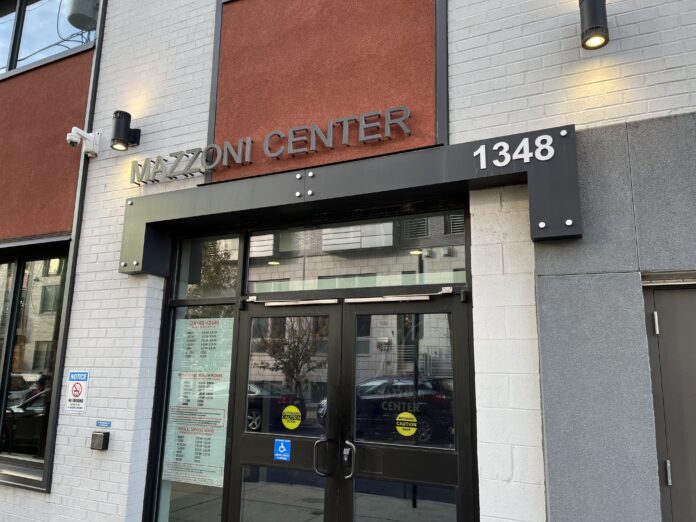This story was updated on Dec. 11 to include a comment from Sultan Shakir regarding layoffs at Mazzoni Center.
The Mazzoni Center recently withdrew a lawsuit it filed against two funding companies that previously sued the nonprofit over breach of contract. According to court documents, the center hoped to prove that the business model used by both funding companies, LCF and Fundkite, is usurious in nature. That lawsuit had also requested restraining orders to prevent the companies from blocking payments to Mazzoni Center via UCC liens.
Mazzoni Center is still dealing with the lawsuits filed by LCF Group and Fundkite — who according to court documents have sought a collective sum of $1.3 million.
Both companies entered into “merchant cash advance” agreements with Mazzoni in Sept 2024 after Rachelle Tritinger, Mazzoni’s former CFO, signed contracts with the companies in order to make payroll. But Mazzoni claims Tritinger did not have the authority to enter into these agreements — which offered Mazzoni relief in exchange for future profits at an alarming interest rate.
The parties could now be in negotiations to settle outside of court, but Mazzoni declined to comment on the matter. As the organization navigates the challenges, it has been communicating with the LGBTQ+ community, reminding the center’s patients and advocates that it will continue to provide care — including low-cost and no-cost services — and is not at risk for closing.
The organization is now asking community members to become ambassadors for the center by creating a personal fundraising page to collect donations and spreading awareness about the good Mazzoni does for the community.
“The most important thing we want to impart to the community is that we are still here, day in and day out, providing comprehensive, whole-person care for our LGBTQ community, including never turning anyone away from care who lacks the resources to pay,” a spokesperson for the organization told PGN. “For 45 years, it has been the community’s support and confidence that has enabled us to do this vital, life-saving work; and, with the community’s continued support, we have every intention to do this work for another 45 years to come.”
The city, which is not involved in the litigation, is now working to assist Mazzoni in their efforts to get on better financial footing — but their own systemic and long-term problems working with nonprofits may have contributed to Mazzoni’s hardship.
Although representatives from Mazzoni previously declined to answer whether or not the organization’s current cash-flow issues are related to excessive wait times for city reimbursements, this issue is a common problem for Philadelphia’s nonprofits. On Dec. 10, the Non-Profit Provider Task Force, which has convened six times since it was established in June 2024, announced its findings and recommendations for improving the way the city does business with nonprofit partners.
During a press conference on the matter, AnnMarie McDowell, president and CEO of CORA Services — a behavioral health and education provider that partners with Philadelphia schools — spoke about the impact on her organization. She was informed last fall that CORA would no longer receive an advance from one of its largest contracts — and the organization’s bank would not increase their line of credit.
McDowell said that her organization went into “emergency mode” in order to make payroll and continue providing services and noted that she was terrified about possible further delays. She added that as the leader of a large organization, she has more options for troubleshooting financial concerns — but other nonprofits are not as fortunate.
“I have seen board members of these small organizations that I’ve been a part of give their own money in order to keep the organizations going,” she said about an opposite experience.
She also underlined the importance of the city addressing interest rates that accumulate as nonprofits take out lines of credit in order to make payroll and continue to provide services as they await contract conformance and payments. The task force’s report noted that the costs of borrowing money cannot be recouped.
“We do not turn people away when we have not yet been paid or paid the true cost of care,” added Anne Rice-Burgess, Chief Executive Officer of Episcopal Community Services — which she described as an anti-poverty organization. “And when we talk about the true cost of care, it’s not just the services, it’s the administrative cost and the cost of compliance.”
These administrative costs, the task force’s report points out, cannot be billed to the city.
“Effectively, this means non-profits are losing money and underinvesting in staff and infrastructure by working with the city to provide crucial services,” the report notes.
At the city’s first LGBTQ+ equity hearing on Oct. 29, Sultan Shakir, Mazzoni’s president and executive officer, echoed the same. He noted during this testimony that at one point, the organization had advanced $600,000 in care and struggled to pay employees due to difficulty receiving city reimbursements. He said the city’s failure to reimburse the center in a timely manner has resulted in an ongoing cash-flow issue.
Representatives for Mazzoni Center did not provide insight about whether or not they’re considering bankruptcy as a response to their current challenges. Bankruptcy would not necessarily shutter the center but would allow for a financial reorganization to take place. However, the organization has taken other steps in an attempt to make ends meet.
“As a part of our commitment to providing life-saving care for the community, Mazzoni Center had to make the difficult decision to adjust staffing levels to ensure we can continue offering critical services for many years to come,” Shakir said in a statement that was sent to PGN. “All currently anticipated staffing adjustments have been announced and shared with affected employees and with the Union for individuals who are represented. We are grateful for our staff members both current and past – who have served our community with compassion, love, and respect.”
A spokesperson from Councilmember Rue Landau’s office previously told PGN that around $1 million was believed to be owed to Mazzoni Center; however, the number has not been confirmed and the spokesperson said only Mazzoni and the departments familiar with each specific invoice would know the exact number. A Mazzoni spokesperson declined to comment on how much the city owes or owed the organization and didn’t comment on whether or not the city has paid any of the outstanding debt to the organization.
Mayor Cherelle Parker announced on Nov. 1 that all departments must “conform and approve every remaining overdue contract” by Nov. 8 and pay all due invoices by Nov. 29. At the time, the remaining contracts totaled $389,303,503 owed to various organizations.
“Working with city leadership, elected officials and nonprofit leaders, we brought about 600 contracts into conformance with just about 100 still remaining,” said Tiffany Thurmond, Mayor Parker’s chief of staff, at the press conference. “We have paid out over $221 million today and that work is still ongoing.”
City representatives declined to answer whether or not Mazzoni Center has been paid at this time.
“Because this matter is involved in litigation, we cannot comment at this time,” said Joe Grace — director of communications for the mayor’s office.
When meeting with the task force, some nonprofit leaders noted that it has taken several months to be paid in full by the city. The task force noted in its report that the average time for vendors to be paid is now 80-85 days. This is down from 114 days a few years ago but, the task force admits, still needs improvement.
This time to contract completion mostly refers to new contracts and existing invoices — not renewals. When delays in renewals occur — which Majority Leader Katherine Gilmore Richardson said has caused wait times of up to a year — nonprofits are forced to continue to provide services without a contract until that new contract is developed and approved. This goes against the city’s stated policies but is necessary for many organizations if they hope to continue serving their communities without disruption.
This, she noted, can have devastating consequences for organizations that operate on “really, really tight budgets and most often have to take out lines of credit to continue to do business with the city.”
The task force uncovered that there is very little consistency across and within each department relating to vendor contracts. This makes it difficult for both nonprofits and city workers to navigate systems effectively and efficiently. The task force also noted that updated technology — which will be rolled out in 2026 — will solve many of the issues vendors experience by significantly improving the city’s ability to manage data and pay vendors in a timely manner.
The task force recommends prioritizing staffing — both by hiring more workers and training all procurement employees on customer service, policies and procedures. Streamlining processes, creating more oversight, and implementing more consistent policies and procedures across departments would also improve delays and communication issues. This, the task force noted, needs review and overhaul.
Gilmore Richardson noted that although the task force’s work is now concluding, she is committed to “addressing the findings outlined in the task force’s report — both legislatively and budgetarily.”
“A lack of monitoring for conformance and payment tracking have been identified — and long-term solutions are being developed now in coordination with the majority leader so that we do not find ourselves here again next year or the year after or ever again,” Thurmond said about tackling obstacles the city faces when working with nonprofits. “We will not go back to simply triaging — and that was the mode that we’ve been in historically.”
“We are laser-focused on addressing inefficiencies, reducing delays, and ensuring clearer communication and accountability throughout the entire contracting lifecycle end-to-end,” she underlined.


